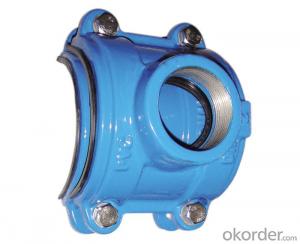DI Pipe Fitting ISO2531/EN545/EN598,for water project
- Loading Port:
- Tianjin
- Payment Terms:
- TT OR LC
- Min Order Qty:
- 100 pc
- Supply Capability:
- 1000 pc/month
OKorder Service Pledge
OKorder Financial Service
You Might Also Like
Specifications
DI Pipe Fitting,Class K12,K14
Suppply Potable/Sewage Water
Standard:ISO2531/EN545/EN598
Competitive Price & Good Service
DI pipe fitting
Key Specifications:
Material : Ductile Cast Iron
Tee/Cross/Bends/Taper/Collar/Cap/Flange Socket/Flange Pipes with Puddle/Duck foot Bend/Flange Bell Mouth/
Size Range : DN 50mm to DN 2600mm
Joint Type : Flange PN10,16,25Bar/ Socket/K Type with Mechanical Gland
Manufacture Standard: ISO 2531/ EN545/EN598/AWWA C110 and C153
Casting Method: Lost foam technique
Annual capacity : 10,000 tons
Coating Exterior: zinc 130g/m2 and bitumen coating 70 microns.
Cement Lining Interior: Portland Cement/ High Alumina Cement/ Sulphate Resisting Cement.
Special requirements on external coating and internal lining can be applied
We also provide accessories such as SBR/EPDM rubber gaskets, bolts&nuts.
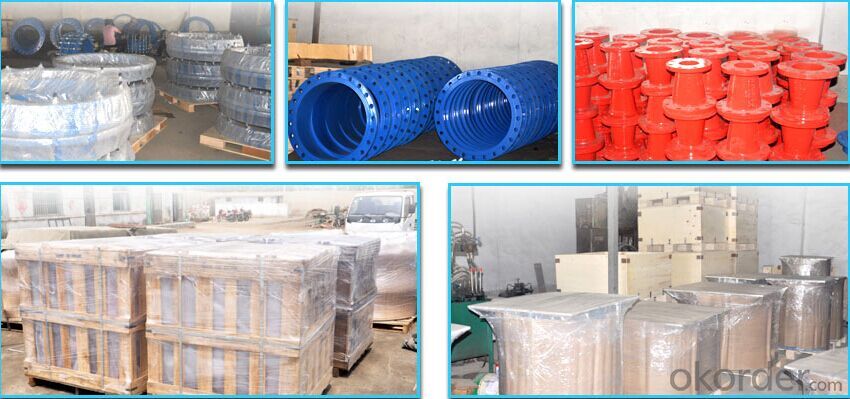
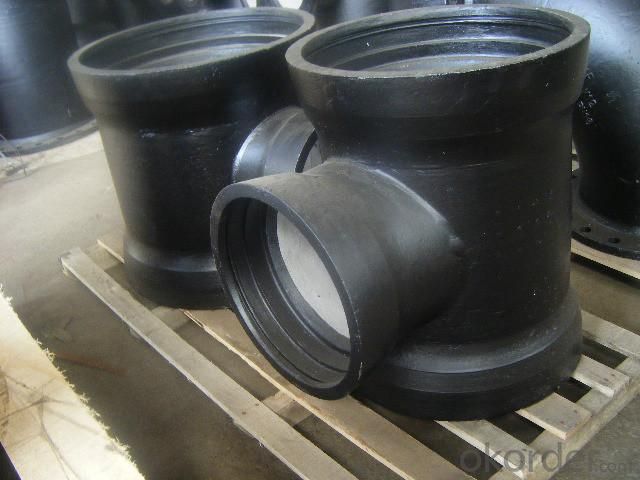
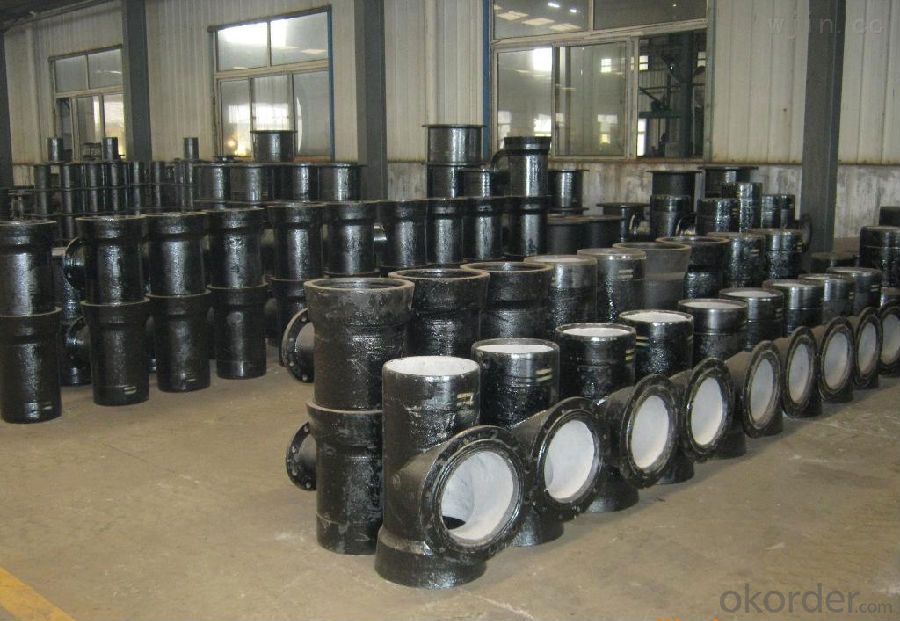
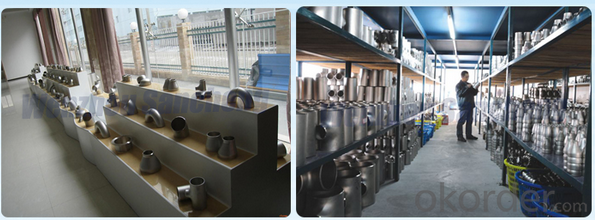
Additional Parts:
Each fitting is strictly inspected according to ISO standard to ensure permanently high performance.
Easy Installation at site and service free for life
Long Service Lifespan
Quotation will arrive you within 24hours once we get your inquiry.
We guarantee offering a competitive price to you.
A copy of original inspection reports of pipes will be offered after shipment.
Photos of loading process will be sent to the customer after shipment effect.
We will follow-up the delivery progress after shipment effect and update to the customer on weekly basis
- Q:Are ductile iron pipes available in different wall thicknesses?
- Yes, ductile iron pipes are available in different wall thicknesses. Ductile iron pipes are manufactured with various wall thicknesses to meet different requirements and applications. The wall thickness of a ductile iron pipe is determined based on factors such as the pipe's diameter, the internal pressure it needs to withstand, and the soil conditions it will be installed in. Pipes with thicker walls are typically used for higher pressure applications or in areas with more challenging soil conditions, while thinner-walled pipes may be suitable for lower pressure applications. The availability of different wall thicknesses allows for flexibility in selecting the appropriate ductile iron pipe for specific projects and ensures that the pipes can efficiently and safely transport fluids or gases.
- Q:Can ductile iron pipes be used for fire protection systems?
- Yes, ductile iron pipes can be used for fire protection systems. Ductile iron is a type of cast iron that exhibits high strength and flexibility, making it suitable for a wide range of applications, including fire protection systems. It has excellent mechanical properties, including high tensile strength and impact resistance, which are important factors for withstanding the high pressures and stresses that can occur during fire suppression efforts. Ductile iron pipes are known for their durability and longevity, which is crucial for fire protection systems that need to be reliable and functional for extended periods of time. They have a longer lifespan compared to other materials, such as PVC or galvanized steel, and are less prone to corrosion, which is especially important for fire protection systems as they need to remain operational even after long periods of inactivity. Furthermore, ductile iron pipes have excellent fire resistance properties. They can withstand high temperatures without losing their structural integrity, ensuring that the fire protection system remains intact and functional during a fire emergency. This is crucial for ensuring the safety of occupants and minimizing property damage. In addition to their mechanical and fire-resistant properties, ductile iron pipes are also compatible with various types of fittings, valves, and accessories commonly used in fire protection systems. This allows for easy installation and integration into existing fire suppression networks. Overall, ductile iron pipes are a reliable and suitable choice for fire protection systems due to their high strength, durability, fire resistance, and compatibility with other system components.
- Q:Can ductile iron pipe be used for water treatment plant applications?
- Yes, ductile iron pipe can be used for water treatment plant applications. Ductile iron pipe is known for its durability, strength, and corrosion resistance, making it suitable for transporting and distributing treated water within a water treatment plant.
- Q:Are ductile iron pipes suitable for use in mining applications?
- Ductile iron pipes are well-suited for mining applications due to their unique properties. Also known as nodular cast iron, ductile iron is a type of iron that has been modified with magnesium or cerium to enhance its microstructure, resulting in increased strength and flexibility compared to traditional cast iron. These enhancements make ductile iron pipes highly resistant to impact, corrosion, and abrasion, which are common challenges in mining environments. In mining applications, ductile iron pipes find multiple uses, including water supply, slurry transportation, and ventilation systems. Their exceptional durability and resistance to wear and tear make them ideal for handling abrasive materials, chemicals, and high-pressure fluids typically encountered in mining operations. Moreover, the ability of ductile iron pipes to withstand heavy loads and external pressures makes them suitable for underground mining, where they may need to support the weight of overlying rock layers. With their high tensile strength and flexibility, ductile iron pipes help prevent pipe failure and reduce the risk of leaks or breaks, ensuring the safety and efficiency of mining operations. Furthermore, ductile iron pipes are relatively simple to install, maintain, and repair. They can be welded or joined using mechanical couplings, allowing for quick and efficient installation at mining sites. Their corrosion resistance also minimizes the need for frequent maintenance and replacement, resulting in cost savings for mining companies. Overall, the superior mechanical properties and durability of ductile iron pipes make them a reliable and practical choice for mining applications.
- Q:How to control mortar proportioning in ductile iron pipe cement coating
- The calculation steps are: first to calculate the amount of plastering engineering (area), and then check the "national construction basic quota" quota in the corresponding amount of mortar project, engineering quantity multiplied by the amount of mortar that fixed amount of mortar, the mortar amount multiplied by the corresponding mix ratio of mortar, the consumption of raw materials can be obtained.
- Q:What pipe can be used to replace the cast iron pipe in the water supply? Thank you
- You are mistaken in concept. The cast iron pipe is the sort of connection method. The ductile iron pipe is classified according to the material.
- Q:Can ductile iron pipes be used in coastal or marine environments?
- Yes, ductile iron pipes can be used in coastal or marine environments. Ductile iron is a type of cast iron that has been treated with magnesium to give it enhanced strength, ductility, and resistance to corrosion. This makes it suitable for use in environments with high levels of moisture, such as coastal or marine areas. Coastal and marine environments are known for their high levels of saltwater, which can cause corrosion in metal pipes. However, ductile iron pipes have excellent corrosion resistance due to their protective coating. This coating acts as a barrier between the pipe and the corrosive elements present in saltwater, preventing the formation of rust and extending the lifespan of the pipes. Furthermore, ductile iron pipes can withstand the high pressures and stresses associated with coastal and marine applications. They have a high tensile strength, allowing them to handle the weight of soil, rocks, and other materials that may be present in these environments. Additionally, ductile iron pipes are resistant to damage from external forces, such as waves or debris, making them a reliable choice for coastal or marine projects. In summary, ductile iron pipes are a suitable choice for coastal or marine environments due to their corrosion resistance, high tensile strength, and durability. They can reliably transport water or other fluids in these challenging environments while maintaining their structural integrity over an extended period of time.
- Q:How does ductile iron pipe resist internal corrosion?
- Ductile iron pipe resists internal corrosion through a combination of its unique material properties and protective coatings. Firstly, ductile iron, also known as nodular cast iron, is made by adding magnesium to molten iron, which causes the graphite in the material to be nodular or spherical in shape. This results in a more flexible and elastic material compared to traditional cast iron, making it less prone to cracking or fracturing under stress. Additionally, ductile iron has a dense, microstructure with a high carbon content, which acts as a barrier to prevent corrosive elements from penetrating the pipe's surface. This inherent resistance to corrosion makes ductile iron pipe suitable for carrying various fluids such as water, sewage, and chemicals without the risk of degradation over time. Furthermore, ductile iron pipes are often internally lined with protective coatings to further enhance their resistance to corrosion. These coatings, such as cement mortar or epoxy, create a barrier between the pipe's surface and the fluid it carries, preventing direct contact and reducing the likelihood of corrosion. These linings are applied during the manufacturing process, ensuring a consistent and durable protection throughout the entire length of the pipe. In summary, ductile iron pipe resists internal corrosion due to its material composition, including the nodular graphite structure and high carbon content, as well as the application of protective coatings. This combination of factors ensures the longevity and reliability of ductile iron pipes in various applications, even in corrosive environments.
- Q:Can ductile iron pipe be used for both water and wastewater applications?
- Yes, ductile iron pipe can be used for both water and wastewater applications. Ductile iron has excellent strength, durability, and corrosion resistance, making it suitable for conveying both clean water and wastewater effectively and safely.
- Q:Are ductile iron pipes resistant to frost heave?
- Yes, ductile iron pipes are generally resistant to frost heave due to their strong and flexible nature.
1. Manufacturer Overview |
|
|---|---|
| Location | |
| Year Established | |
| Annual Output Value | |
| Main Markets | |
| Company Certifications | |
2. Manufacturer Certificates |
|
|---|---|
| a) Certification Name | |
| Range | |
| Reference | |
| Validity Period | |
3. Manufacturer Capability |
|
|---|---|
| a)Trade Capacity | |
| Nearest Port | |
| Export Percentage | |
| No.of Employees in Trade Department | |
| Language Spoken: | |
| b)Factory Information | |
| Factory Size: | |
| No. of Production Lines | |
| Contract Manufacturing | |
| Product Price Range | |
Send your message to us
DI Pipe Fitting ISO2531/EN545/EN598,for water project
- Loading Port:
- Tianjin
- Payment Terms:
- TT OR LC
- Min Order Qty:
- 100 pc
- Supply Capability:
- 1000 pc/month
OKorder Service Pledge
OKorder Financial Service
Similar products
New products
Hot products
Related keywords
